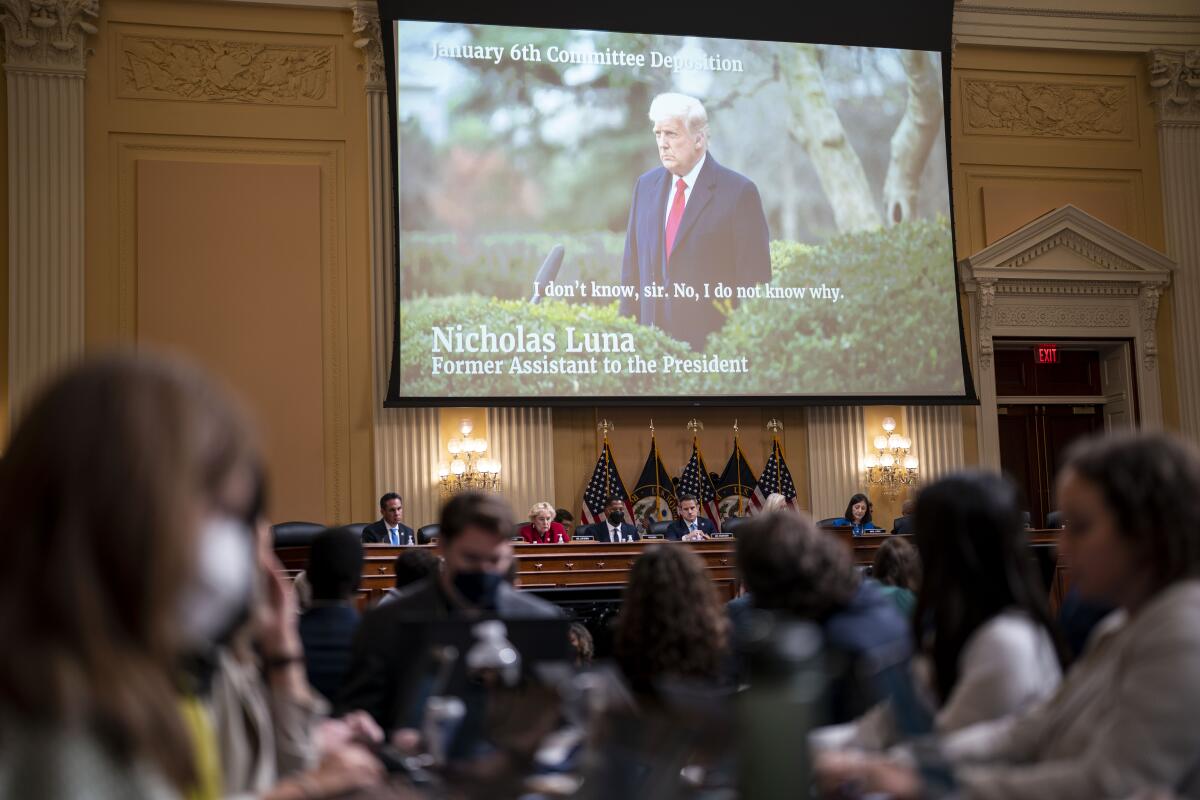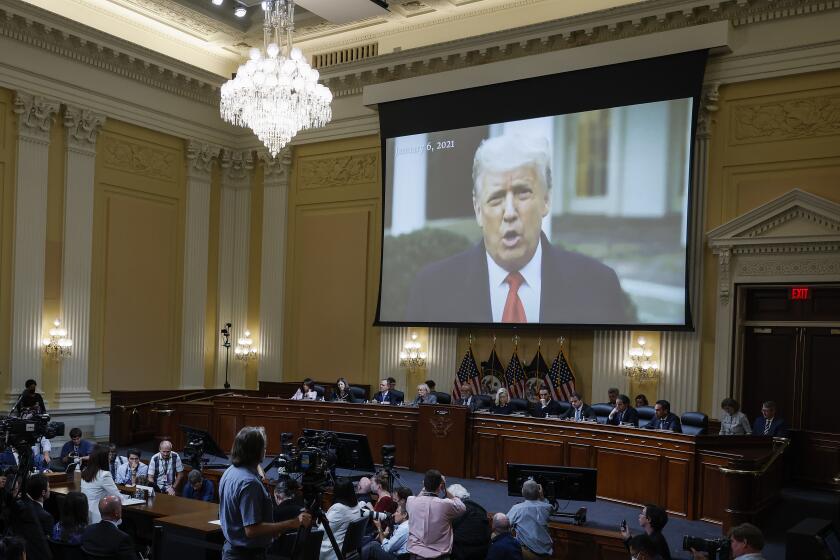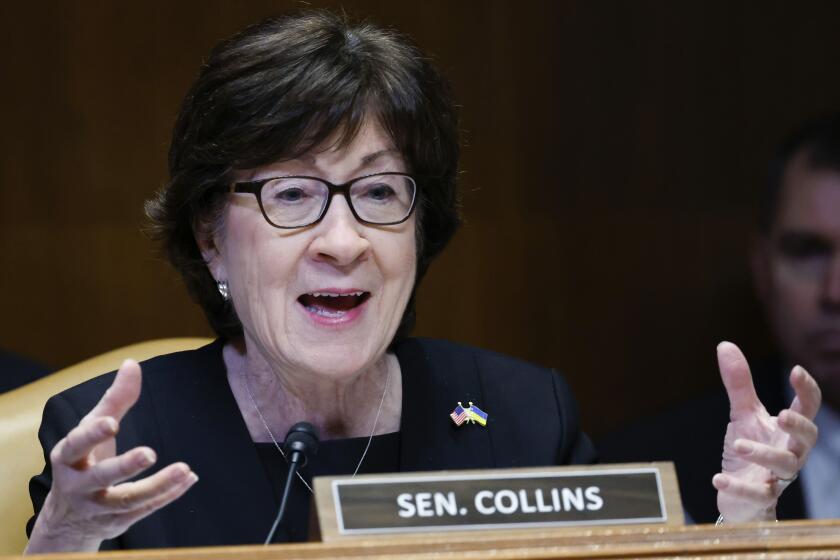What’s the TV schedule for the next Jan. 6 committee hearing?

The House Jan. 6 select committee announced Thursday that its next hearing will be on Oct. 13 at 10 a.m. Pacific. And it may be the panel’s last one, although members are sending conflicting signals on that front.
After delaying the hearing as Hurricane Ian approached Florida, the committee said on its Twitter account last month that it would announce a new date “soon.”
“Unless something else develops, this hearing at this point is the final hearing,” committee Chair Bennie Thompson (D-Miss.) told reporters on Sept. 20. “But it’s not in stone because things happen.”
The House Jan. 6 committee will hold its final hearing Dec. 19 at 10 a.m. Pacific, when it will vote on criminal referrals and may release its report.
In fact, other committee members say they think more sessions will be required. For example, when asked whether the next session would be the last, Vice Chair Liz Cheney (R-Wyo.) said at a conference in Austin on Sept. 24: “No, that’s not right. We don’t anticipate that it will be the last hearing.”
The panel is still obliged to deliver a written report on the findings of its nearly 15-month investigation into why the Jan. 6, 2021, attack on the U.S. Capitol happened and how to prevent another one. That report is expected by the end of the year.
How to watch
ABC, NBC, CBS, CNN, MSNBC and CSPAN have all been airing the hearings instead of their usual programming. Fox News has carried the hearings held in the daytime, while Fox Business has aired the ones held in prime time.
The hearings have also been streamed on the select committee’s YouTube channel, which also offers a recording of each completed session.
Earlier, members of the panel were predicting two or three more hearings, given the amount of ground still to cover. If there’s only one, it’s not clear how the panel will be able to address all the questions it has raised about the events surrounding the attack.
The proceedings have been broadcast live on YouTube, the major TV networks, CNN, MSNBC and C-SPAN. Fox News has offered live coverage of sessions held early in the day.
Previous revelations
June 9: Illustrating just how violent the Jan. 6 attack was, Capitol Police Officer Caroline Edwards testified that she was “slipping in people’s blood” as she fought to defend the lawmakers inside.
June 13: The committee revealed evidence that then-President Trump’s advisors told him repeatedly there had been no significant fraud during the 2020 presidential election, yet he continued to spread the “Big Lie.”
June 16: A top aide to Vice President Mike Pence told of the pressure campaign by Trump and conservative California lawyer John Eastman to get Pence to reject electoral votes from seven states Joe Biden won — even though they knew their actions were illegal.
June 21: The speaker of the Arizona House of Representatives and two election officials from Georgia, all Republicans, detailed the efforts by Trump and his lawyers to get them to reverse election results without the legal authority to do so.
A bipartisan group of senators has reached agreement on proposed changes to the Electoral Count Act in an attempt to prevent another Jan. 6 attack from occurring.
June 23: Three former top Justice Department officials recounted the former president’s efforts to have the department support his unfounded claims about a tainted election, as well as his aborted effort to install an acting attorney general who backed those claims.
June 28: Former White House aide Cassidy Hutchinson testified that discussions inside the White House on Jan. 6 revealed that Trump had waved off concerns about weapons in the crowd that day, that he’d wanted to go to the Capitol so badly that he’d gotten into a dispute with a Secret Service officer in his vehicle, and that he didn’t think the rioters who were chanting “Hang Mike Pence” were doing anything wrong.
July 12: Witnesses and evidence presented by the committee laid out how Trump’s call for a protest on Jan. 6 reverberated with his supporters and extremist groups, who interpreted it as a summons to stop Congress — violently, in some people’s minds — from affirming Biden’s victory in the electoral college.
July 21: Two former White House aides described how Trump ignored pleas from advisors, family members and Republicans in Congress to call off the rioters.
The committee held a series of hearings in June and July, with others planned. Here’s what you need to know.
Future hearings
The committee hasn’t disclosed an agenda for the next session. But members have left a number of clues.
On Sept. 1 the committee revealed a new area of inquiry: It asked former House Speaker Newt Gingrich (R-Ga.) to testify voluntarily about his “role in spreading misinformation about the election in the days leading up to the December 14, 2020, meeting of the Electoral College.” According to the committee, “evidence shows that Mr. Gingrich pushed messages designed to incite anger among voters even after Georgia election officials had faced intimidation and threats of violence.”
In addition, Rep. Zoe Lofgren (D-San Jose) told MSNBC on Aug. 31 that the committee has been grappling with two issues related to potential obstruction of justice and witness tampering.
Noting that the Secret Service deleted records it had been told to preserve, she said, “There is a concern about some aspects of the service’s behavior, and we need to uncover it.” The committee is also looking into “the possibility for coercive action” by lawyers whom Trump and his allies paid to represent certain witnesses, she said, adding: “We are learning some more things about that that we will, at the proper time, reveal.”
Another witness yet to be heard from is Trump advisor and former White House aide Stephen K. Bannon, who was convicted in July on charges of contempt of Congress for defying the panel’s subpoena last year. In a recording obtained by Mother Jones, Bannon told associates a few days before the 2020 election that he expected Trump to declare victory prematurely and claim the election was stolen.
“What the new Steve Bannon audio demonstrates is that Donald Trump’s plan to falsely claim victory in 2020, no matter what the facts actually were, was premeditated,” Cheney said at the end of the July 21 hearing.
The panel is still seeking phone records and testimony that could shed more light about how the Jan. 6 attack fit with other efforts to overturn the election results. It has also been gathering evidence about the actions of Trump’s closest allies in Congress, and about the ties between extremist groups and Trump insiders such as Roger Stone.
Finally, the resolution passed by the House to create the panel instructed it to explore how the nation’s security apparatus got blindsided by the assault on the Capitol and to recommend ways to prevent such violence in the future. But that part of its mission hasn’t gotten much attention at the hearings.
Rep. Jamie Raskin (D-Md.), a member of the panel, told Time magazine in September that he expected to see a hearing devoted to “the continuing threats to democracy in America and what needs to be done legislatively at the federal level and at other levels of government in order to fortify ourselves against coups, insurrections, political violence, and attempts to sabotage elections.”
Times staff writer Sarah D. Wire contributed to this report.
About The Times Utility Journalism Team
This article is from The Times’ Utility Journalism Team. Our mission is to be essential to the lives of Southern Californians by publishing information that solves problems, answers questions and helps with decision making. We serve audiences in and around Los Angeles — including current Times subscribers and diverse communities that haven’t historically had their needs met by our coverage.
How can we be useful to you and your community? Email utility (at) latimes.com or one of our journalists: Jon Healey, Ada Tseng, Jessica Roy and Karen Garcia.
More to Read
Get the L.A. Times Politics newsletter
Deeply reported insights into legislation, politics and policy from Sacramento, Washington and beyond. In your inbox three times per week.
You may occasionally receive promotional content from the Los Angeles Times.














